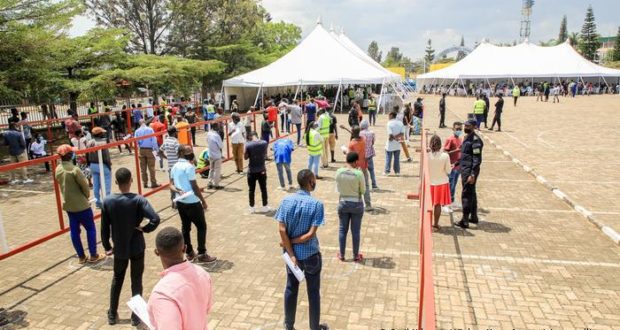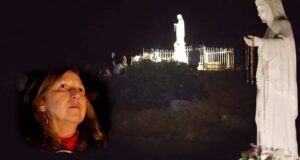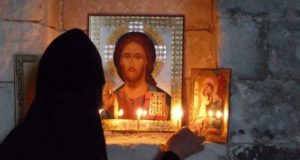📌مسيحيون يطلبون من الجنود إطلاق النار عليهم أو إغراقهم حتى الموت..
📌 عائلات تهرب من منازلها رافضة التطعيم..
📌 حملة من الباب إلى الباب لتحديد الأشخاص غير المطعمين في العاصمة..
📌 حُددّت بالكنائس على 50 % والتجمعات المنزلية على 50 شخصًا (إذا هالشي علمي كما يزعموا ، ليه ما طبّق في مناطق حُددت بِـ10% أو 20%) 🤐
ريموند وولف – استخدمت الدولة الأفريقية متطلبات لقاح قاسية بشكل غير عادي ، وفرضت التطعيم ضد فيروس كورونا للكنائس وحفلات الزفاف والشركات الخاصة.
تحتجز الشرطة الرواندية والمسؤولون المحليون أشخاصًا غير محصنين ويحقنونهم بالقوة بلقاحات COVID-19 ، حسبما قال العديد من الروانديين المجهولين لمنافذ دويتشه فيله الألمانية في تقرير هذا الأسبوع.
شهد رجل من منطقة موهانجا في المقاطعة الجنوبية لرواندا لـ DW أن إداريًا محليًا ركله في باب منزله في منتصف الليل وسحبه إلى منشأة حكومية ، حيث تم تقييد يديه وتم تطعيمه لاحقًا.
قال: “حوالي الساعة 4 صباحًا ركل قائد الزنزانة المحلية بابي”. اعتقدت أنهم كانوا لصوص لأنني كنت لا أزال نائمة. كان هناك ثلاثة أشخاص يقفون على باب منزلي ، وأمروني بالذهاب إلى مكاتب القطاع ، وتم تسليمي إلى أفراد الأمن وقيل لي إنني سوف أتلقى التطعيم ضد إرادتي “.
وأضاف الرجل أنه اضطر للجلوس تحت أشعة الشمس حتى المساء ، وبعد ذلك حاصره خمسة من رجال الشرطة وستة مدنيين وأمروه بدخول غرفة.
يتذكر قائلاً: “انقضوا عليّ وجرجروني على الأرض ، وعاملوني بخفة ، ودفعوا ركبتيهم في ظهري وفي كل مكان ، بينما كانت الأصفاد تقطع جروحًا عميقة حول معصمي”. “لقد حاولوا خنقني”. ثم جاء المسعفون وحقنوه برصاصة (الطِعم)، على حد قول الرجل.
تعكس الرواية المروعة شهادات مماثلة من جميع أنحاء رواندا. قالت مجموعة من مسيحيي الخمسينيين الذين رفضوا اللقاحات لـ DW إن الجيش والشرطة والمسؤولين المحليين احتجزوهم لمدة أسبوع وحاولوا “توعيتهم” للحصول على اللقاحات ، قبل تطعيمهم دون موافقتهم بعد أن استمروا في المقاومة.
“لقد رفضنا تمامًا أخذ اللكمات وبدلاً من ذلك طلبنا من الجنود والشرطة إطلاق النار علينا أو إغراقنا حتى الموت. لقد نظمنا مظاهرة ، لكنهم قالوا إنهم لن يطلقوا النار علينا. ” “عندما أدركوا أننا لسنا مستعدين لتغيير رأينا ، أحضروا العديد من ضباط الشرطة ، وكُبلت أيدينا”.
قال: “أوقفنا رجال الشرطة على الأرض ، وتم تطعيمنا“.
وبحسب ما ورد احتُجزت المجموعة في مراكز عبور تستخدم عادة للمجرمين وأطفال الشوارع في منطقة نغوروريرو في المقاطعة الغربية لرواندا.
وقال رجل رواندي آخر ، من منطقة رواماجانا في المنطقة الشرقية ، لـ DW إن المسؤولين سعوا إلى حقنه هو وزوجته ، مما دفعهم إلى الفرار من منزلهم. قال الرجل إنه كان يعاني من الملاريا ويتناول الأدوية في ذلك الوقت.
لقد توسلت إليهم ألا يقوموا بتطعيماتي. عندما أصروا ، هربنا من منزلنا “.
وأشار الرجل إلى أنه “لست أنا وحدي” ، مضيفًا أن العديد من جيرانه تعرضوا للطعن بالقوة. قال: “إذا أردت ، يمكنني أن أشير إلى أماكن مختلفة حيث هم”.
قالت DW إنها لا تستطيع التحقق من الحسابات بشكل مستقل.
دفع برنامج التطعيم في رواندا البعض إلى مغادرة البلاد تمامًا. أفادت وكالة فرانس برس الأسبوع الماضي أن حوالي 100 رواندي فروا إلى جمهورية الكونغو الديمقراطية ، ونزلوا في جزيرة إيدجوي ، التي استضافت سابقًا عشرات الآلاف من اللاجئين خلال الإبادة الجماعية في رواندا عام 1994.
“عدد قليل من الروانديين عبروا إلى البلدان المجاورة بدعوى أنهم ضد التطعيم ، لأسباب دينية في الغالب. ونقلت الصحيفة عن المتحدث باسم الحكومة الرواندية يولاندي ماكولو قوله إن معظمهم عادوا أو عادوا بفضل التعاون الثنائي.
في بيان يوم الثلاثاء لـ DW ، أكد رئيس بلدية نجوروريرو كريستوفر نكوسي أن منطقته قامت بالفعل بـ “توعية” الأشخاص الذين قاوموا حقن COVID لكنهم ادعى أنه “لم يكن على علم” بأي حوادث تطعيم قسري.
“يتم توعية أولئك الذين لديهم مقاومة ويتم تطعيمهم بعد ذلك لأنه حتى الآن لدينا الكثير ممن لم يتم تطعيمهم بعد. ما زلنا في طور توعيتهم. قال نكوسي: “لست على علم بأي حالة تطعيم قسري في منطقتي”.
ولم ترد وزارة الصحة ومكتب رئيس الوزراء في رواندا على طلبات من DW للتعليق.
أخبرت CLADHO ، وهي مظلة لجماعات حقوق الإنسان في رواندا ، الإذاعة العامة الألمانية أن المنظمة على دراية بالتقارير الإعلامية حول التطعيم الإجباري ضد COVID وهي تحقق حاليًا. قال كلادو إن تطعيم الناس ضد إرادتهم أمر غير قانوني في رواندا.
تتمتع رواندا بأحد أعلى معدلات التطعيم في إفريقيا ، حيث تم “تلقيح كامل” بنسبة 42 بالمائة من سكانها البالغ عددهم 13 مليون شخص ، وتم حقن 17 بالمائة بجرعة واحدة على الأقل بحلول أواخر ديسمبر ، وفقًا لموقع Our World in Data. استخدمت البلاد طلقات Moderna و Pfizer و AstraZeneca-Oxford وكانت أول دولة أفريقية تطرح لقاح Pfizer في العام الماضي.
استخدمت الحكومة الرواندية متطلبات لقاح COVID قاسية بشكل غير عادي ، وفرضت التطعيم للكنائس وحفلات الزفاف ووسائل النقل العام ، وكذلك للعديد من الأماكن العامة ، بما في ذلك المؤتمرات والمطاعم والحانات والفنادق. الموظفين الخاصين والعامة يجب أيضا أن يتعرضوا للطعن.
في الصيف الماضي ، أطلقت السلطات الصحية حملة من الباب إلى الباب لتحديد الأشخاص غير المطعمين في العاصمة كيغالي ، والتي وصفها رئيس البلدية في ذلك الوقت بأنها محاولة أخرى “لتوعية” أولئك الذين لم يتم تطعيمهم. أكثر من 90 في المائة من سكان كيغالي بعمر 12 عامًا فما فوق “مُلقحون بالكامل”.
شددت الحكومة القيود في الأسابيع الأخيرة في ضوء متغير Omicron المعتدل ، وحُددّت بالكنائس على 50 % والتجمعات المنزلية على 50 شخصًا ، بينما أمرت بأن يشرف المسؤولون المحليون على التجمعات المنزلية. أمر مركز رواندا للطب الحيوي (RBC) في وقت سابق من هذا الشهر شهادات التطعيم بمغادرة البلاد.
Rwanda forcibly injecting people with COVID vaccines: report
Raymond Wolfe – The African nation has employed unusually harsh vaccine requirements, mandating COVID vaccination for churches, weddings, and private businesses.
Rwandan police and local officials are detaining unvaccinated people and forcibly injecting them with COVID-19 vaccines, several anonymous Rwandans told German outlet Deutsche Welle (DW) in a report this week.
One man from the Muhanga district of Rwanda’s Southern Province testified to DW that a local administrator kicked in his door in the middle of the night and dragged him to a government facility, where he was handcuffed and later vaccinated.
“Around 4 a.m. our local cell leader kicked in my door,” he said. “I thought they were thieves because I was still asleep. There were three people standing at my door, they ordered me to go to the sector offices, and I was handed over to security personnel and I was told that I was going to be vaccinated against my will.” Cells refer to administrative entities in Rwanda between villages and districts, according to DW.
The man added that he was forced to sit under the sun until evening, after which five police officers and six civilians surrounded him and ordered him to enter a room.
“They pounced on me and dragged me on the ground, manhandling me, shoving their knees in my back and everywhere, as the handcuffs were cutting deep wounds around my wrists,” he recalled. “They even tried to suffocate me.” Medics then came and injected him with a shot, the man said.
The harrowing account echoes similar testimonies from across Rwanda. A group of Pentecostal Christians who refused the vaccines told DW that military, police, and local officials detained them for a week and tried to “sensitize” them to get the jabs, before vaccinating them without their consent after they continued to resist.
“We completely refused to take the jabs and instead asked the soldiers and police to shoot us or drown us to death. We put up a demonstration, but they said they won’t shoot us,” a man attested. “When they realized we were not ready to change our mind, they brought in many police officers, and we were handcuffed.”
“The police officers held us to the ground, and we were vaccinated,” he said.
The group was reportedly held in transit centers typically used for criminals and street children in the Ngororero district of the Western Province of Rwanda.
Another Rwandan man, from the Rwamagana district in the Eastern Province, also told DW that officials sought to inject him and his wife, prompting them to flee their home. The man said he was suffering from malaria and taking medication at the time.
“I begged them not to vaccinate me. When they insisted, we fled our home,” he related.
“It’s not only me,” the man noted, adding that many of his neighbors were forcibly jabbed. “If you want, I can point to different places where they are,” he said.
DW said that it could not independently verify the accounts.
Rwanda’s vaccination program has driven some to leave the country altogether. AFP reported last week that around 100 Rwandans fled to the Democratic Republican of the Congo, landing on Idjwi island, which previously hosted tens of thousands of refugees during the 1994 Rwanda genocide.
“A handful of Rwandans crossed over to neighboring countries claiming to be against vaccination, mostly for religious reasons. Most have returned or are returning, facilitated by bilateral cooperation,” Rwandan government spokesperson Yolande Makolo was quoted as saying.
In a statement Tuesday to DW, Ngororero mayor Christopher Nkusi confirmed that his district has indeed “sensitized” people who have resisted the COVID injections but claimed that he “was not aware” of any incidents of forcible vaccination.
“Those with resistance are sensitized and vaccinated afterwards because even right now we have many who are not yet vaccinated. We are still in the process of sensitizing them. I am not aware of any case of forced vaccination in my district,” Nkusi said.
Rwanda’s health ministry and the prime minister’s office did not respond to requests from DW for comment.
CLADHO, an umbrella of human rights groups in Rwanda, told the German public broadcaster that the organization is aware of media reports about forced COVID vaccination and is currently investigating. Vaccinating people against their will is illegal in Rwanda, CLADHO said.
Rwanda has one of the highest vaccination rates in Africa, with 42 percent of its 13 million people “fully vaccinated” and another 17 percent injected with at least one dose by late December, according to Our World in Data. The country has used the Moderna, Pfizer, and AstraZeneca-Oxford shots and was the first African nation to roll out Pfizer’s jab last year.
The Rwandan government has employed extraordinarily harsh COVID vaccine requirements, mandating vaccination for churches, weddings, and public transportation, as well as for many public settings, including conferences, restaurants, bars, and hotels. Private and public employees must also be jabbed.
Last summer, health authorities launched a door-to-door campaign to identify unvaccinated people in the capital of Kigali, which the mayor described at the time as another effort to “sensitize” those who had not been vaccinated. More than 90 percent of Kigali residents 12 years old and up are “fully vaccinated.”
The government has ramped up restrictions in recent weeks in light of the milder Omicron variant, limiting churches to 50 percent capacity and at-home gatherings to 50 people, while ordering that home gatherings be supervised by local officials. The Rwanda Biomedical Centre (RBC) earlier this month mandated vaccination certificates to leave the country.
 Agoraleaks Agoraleaks
Agoraleaks Agoraleaks







